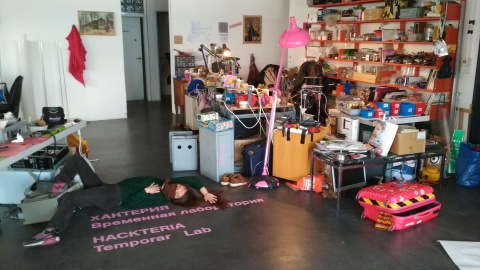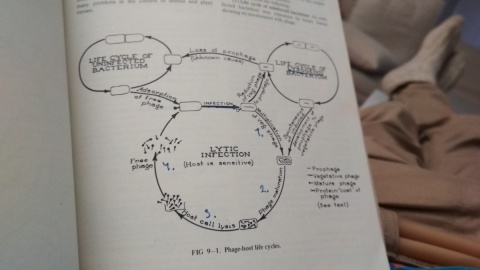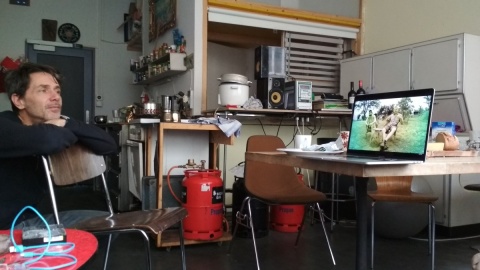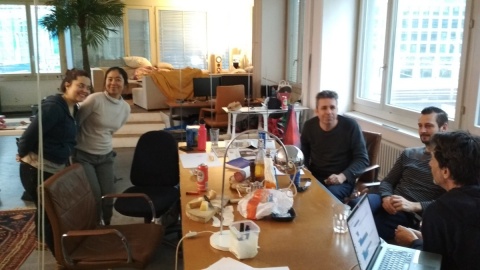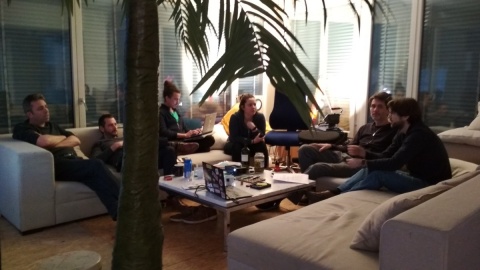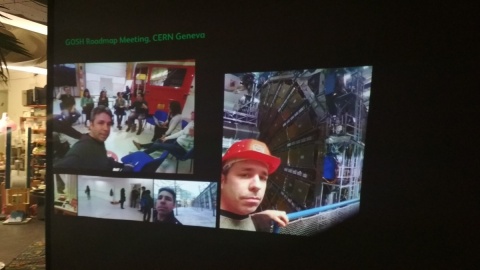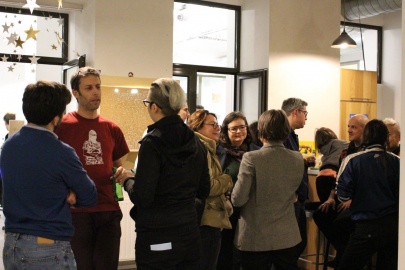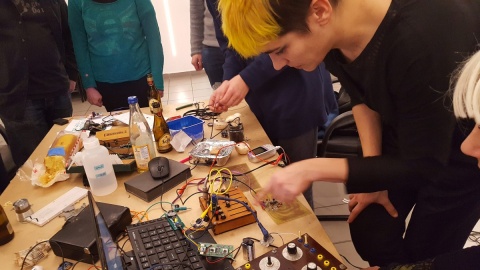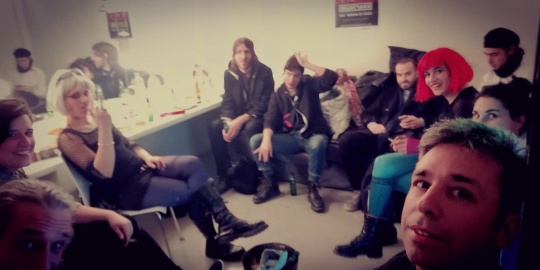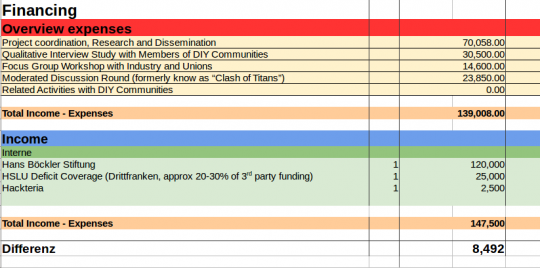Participation in Decision Making by Members of DIY Communites
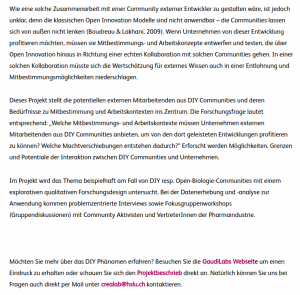
Contents
- 1 Project Description
- 2 Project Phases
- 3 Events
- 3.1 Digital Biology and Do-it-Yourself (DIY) Communities Gathering
- 3.2 Hackteria Futures Meeting, 19-20. Jan 2018
- 3.3 Interview sessions various Jan - March 2018
- 3.4 Community Gatherings and focus discussions Jan - April 2018
- 3.5 How should we call that event? not Confrontation, but? Convergence?, sometime in June 2018
- 3.6 Presentation of Results, tba late summer 2018?
- 4 Related Information
- 5 Organisation
Project Description
Mitbestimmung von Mitarbeitenden aus DIY-Communities
"This project asks: Which co-determination (participation in decision making) and work contexts do companies have to offer external employees from DIY communities, so that successful collaborations can come about? Which power shifts arise as a result?"
See original announcement on CreaLab Blog
Participation in Decision Making by Members of DIY Communites
The trend towards Do-It-Yourself (DIY) and open knowledge sharing in communities is becoming a socially significant phenomenon. The resulting initiatives are based on collaboration and sharing: they understand jointly developed technologies, procedures and methods as well as information as common goods. The collaboration between users and developers combined with the openly shared data makes the spread and use of technologies more efficient, faster and much cheaper than in research and development departments (R & D ) of traditional companies.
This DIY is a challenge for established institutions including high-tech companies such as pharmaceutical companies or future technology manufacturers. Businesses are generally slow to notice this development and skilled employees are leaving the companies and seek for new opportunities and work environments in the open communities. For companies to grow with this new challenge, to avoid disruption and allow people to transition between institutional work and community work more easily a form of collaboration would be desirable.
However, it is unclear how such cooperation between companies and DIY communities could be shaped, because the classic open innovation models are not applicable - the communities can not be controlled from the outside (Boudreau & Lakhani, 2009). New participation and work concepts that go beyond open innovation towards true collaboration need to be developed. In such a collaboration questions of appreciation of knowledge, remuneration and co-determination opportunities have to be addressed.
This project puts members of DIY communities in the focus and aims to identify their needs for a successful collaboration with companies and institutions. The research question is accordingly: "Which co-determination and work contexts do companies have to offer members of DIY communities in order to establish a mutually beneficial collaboration? Which shifts in power result from this? "The possibilities, limits and potentials of the interaction between DIY communities and companies are explored.
Download application (in German): File:Antrag_WolfGaudenzKlotz_final_rev2.pdf
Project Phases
See further down for a review of the #Preperations and history of application, call it Phase 0.
Phase 1: Interview study with DIY community members
Qualitative problem-centered interviews with 10 members of the Hackteria and / or Digital Biology Community, in which the Interview partners express their experiences and ideas in relation to the research topic. Data analysis and interpretation. Method: Problem centered interviews. Analsys according to Miles and Huberman (1994)
Planned completion of the phase: March 2018
Phase 2: Focus Group Workshop
In a moderated focus group workshops with business executives and work union representatives the interview results are studdied. By bringing together multiple actors in forming opinions and finding solutions extreme or socially un-shared opinions get excluded. (Pollock, 1995).
Planned completion of the phase: May 2018
Phase 3: Action Research
By bringing together members of DIY communities, with business executives and work union representatives the potentials and framework conditions of a collaboration are discussed.
Planned completion of the phase: May 2018.
Phase 4: Analysis, writing and dissemination
Planned completion of the phase: August 2018.
Post-Phase: Review and Follow-up, Dec 2018
Events
Digital Biology and Do-it-Yourself (DIY) Communities Gathering
Hosting
- B&B Bettstatt
- Hotel Fox
- Airbnb
Venues
- HSLU
- GaudiLabs
- FabLab Luzern
- Labor Luzern
- In the mountain
Hackteria Futures Meeting, 19-20. Jan 2018
See announcement and upcoming documentation on the [https://www.hackteria.org/workshops/hackteria-futures-meeting-anorg-zurich-19-20-jan-2018/ hackteria blog].
We have scheduled a hackteria network meeting, aimed at hearing more from our friends in the network about their recent activities and where hackteria should/could develop further into the next years, the 10 years anniversary and onwards. Through this collaboration in the study we tried to create a comfortable environement for the start of the interviews and had the pleasure of getting first interesting insights from our network.
The interviees were: Julian Chollet, Gabriela Sanchez, Stefan Deuber and Eugenio Battaglia
Interview sessions various Jan - March 2018
Paris as part of Open Source Body Festival 22-27. Jan 2018
Trip to Berlin for preparatory SoilGeeking? When?
- Lucy
- Alessandro
- (Winnie, see podcast)
- invite more to join...
Connect to "nordic" DIYbio network?
http://www.howto-things.com/Stavanger_meeting_2018
- malte
- miga
- ...
Hack-Weekend on SoilGeeking in Switzerland
Connect to Utopiana and hackuarium? or RandeLab, or both?
- Vanessa
- Yanwu
- (Lucy)
- Rachel
- Maya
- ...
Community Gatherings and focus discussions Jan - April 2018
How should we call that event? not Confrontation, but? Convergence?, sometime in June 2018
Presentation of Results, tba late summer 2018?
Related Information
Notes from meetings and discussion on Gdoc
Discussion on GOSH forum "Differences in opportunity for institution- v.s. community-based folks"
DIY Science group on Github and googlegroups
Discussion on Hackteria Forum post BioFabbing "DIY BIO - Fair Play"
Organisation
Project Partners
- HSLU - University of Applied Science and Arts Lucern - Interdisciplinarry Research Group, Future Laboratory CreaLab
- Prof. Dr. Patricia Wolf (Project Management)
- Prof. Ute Klotz
- Urs Gaudenz / GaudiLabs
- Nguyen Ngoc Minh Chau
- Berisha Hamz
- Hackteria - Global Network represented by Dr. Marc Dusseiller (Project Management)
- Councelling Partners: Lucy Paterson, Science Hackdays Berlin / LacunaLab
Project Organization
Roles...
Project Funding
- Hans Böckler Stiftung (105k €, confirmed)
Die Hans-Böckler-Stiftung (HBS) ist das Mitbestimmungs-, Forschungs- und Studienförderungswerk des Deutschen Gewerkschaftsbundes (DGB). Sie ist in allen ihren Aufgabenfeldern der Mitbestimmung als Gestaltungsprinzip einer demokratischen Gesellschaft verpflichtet.
- HSLU - University internal support funding (deficit coverage up to 20k €)
- International Hackteria Society - internal (in-kind and material contributions up to 2k €)
Detailed summary of budget will be available here! See below a work-in-progres budget summary in CHF.
Preperations and history of application, call it Phase 0
Updated Jan 2018
- June 2016 | "Skizze" pre-proposal developed, HSLU internal
- Sep - Nov 2016 | Application writing, HSLU internal, Marc notified by urs personal message
- Nov 2016 | Application almost submitted, feedback from marc 1 day before and some personal discussion between urs and marc
- 21.11.2016 | Submitted
- February 2017 | Waiting for "Gutachten" and revisions
- June 2017 | HBS Jury meeting
- 26.6.2017 | Application accepted, HSLU notified
- Aug 2017 | Project shifted towards October
- Oct 2017 | Project start and kick-off meeting
- Dec 2017 | First Meeting with Community Representative
- Jan 2018 | Interview design and pilot interviews
Challenges
- Strong asymmetry in terms of problem awareness. There is barely any connections between business and community.
- Maximum difference in dealing with knowledge: The Pharmaceutical industry is very strong on the patenting of innovation, DIY bio communities rely on open knowledge sharing and open licensing
- Transdisciplinary nature of the project. Participating experts interact in an open discussion and dialogue, giving equal weight to each perspective and relating them to each other. This is difficult because of the overwhelming amount of information involved, and because of incommensurability of specialized languages in each field of expertise. To excel under these conditions, researchers need not only in-depth knowledge of their respective fields, but skills in moderation, mediation, association and transfer.
Communication and Dissemination of Results
- Presentation in DIY Communities
- Scientific Publication
- Practitioners Report
Protection of Privacy and use of Information
tu
- Interviews are recorded and analyzed
- Workshops are filmed and analyzed

